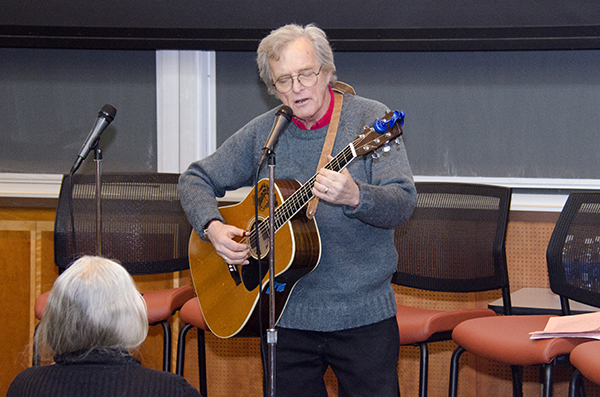

On Wednesday, students gathered in the Coykendall Science Building Auditorium to be educated on the worldwide environmental and health effects of the Fukushima Power Plant disaster that decimated parts of Japan in 2011.
“Fukushima and You,” co-hosted by Occupy New Paltz and the Cancer Awareness Coalition, let community members gather to learn about the ongoing dangers of nuclear power plants and the best ways, if any, people can protect themselves, according to co-planner Michele Riddell.
The two hour event started at 7 p.m. and featured an array of speakers, including Vassar radio host of “Blue Plant” Chris Ruhe, who serenaded the audience with his guitar and a song, Joel Tyner of the Dutchess County Legislature and SUNY New Paltz Adjunct Professor of Biology Michael Boms. Co-sponsors include New Paltz Women in Black, Ulster County Veterans for Peace and the SUNY New Paltz Environmental Task Force. Musician and Clearwater founder Pete Seeger was scheduled to speak but couldn’t attend due to health reasons.
Riddell’s inspiration for educating the public on Fukushima’s disastrous impacts was sparked by an article her daughter sent her, that listed 28 reasons why we need to worry about nuclear energy. Distressed after reading it, she went to her friend Kimiko Lee’s house to discuss her concerns.
“Kimiko said ‘Let’s tell people about it,’” Riddell said. “At first I didn’t want to tell people, because I thought ‘What would we do?’ But then we realized we need to talk about it.”
Lee, a member of Mothers and Others to Shut Down Indian Point, Rose Marie Williams of the Cancer Awareness Coalition and Riddell threw the event together in three to four weeks, Riddell said.
Riddell played a video for the audience called “Fukushima: Beyond Urgent,” and literature was offered that highlighted the dangers of nuclear energy.
Williams discussed ways people can boost their immune systems so it can stand the possible bombardment of radiation and outlined safety precautions to follow in the event of a radiological disaster.
“We are really close to [nuclear power plant] Indian Point, and it is operating without a license,” Riddell said. “People are talking about the monster in our backyard.”
Riddell said if Indian Point Energy Center, located 50 miles down the Hudson River in Buchanan, were to experience a nuclear disaster, “it would be the end of New York.”
Boms, a proponent of alternative energy, said he agreed to speak at the event because, as a society that is choosing to rely on nuclear energy, “we are playing with fire but we are getting burned.”
Boms said Fukushima may end up with more detrimental long-term effects than the 1986 Chernobyl disaster in Ukraine, which the Greenpeace organization predicts the disaster will result in 93,000 cancer related deaths.
“This is much bigger [than Chernobyl] and has contaminated so much water and is being carried all over. And with the prevailing winds, it’s also being carried to the US. It’s a really serious indication of the future outcome,” Boms said. “It’s so severe that there are 50 nuclear power plants in Japan and they shut all of them down. Even Germany and France, who rely on nuclear power, are decommissioning [nuclear power plants] and are talking about going to alternative energy within 5-10 years.”
Boms said over time, people can expect to see a rise in health impacts from Fukushima’s radiation, like thyroid cancer and an increase in dead zones in the Pacific Ocean, an early sign of destruction of the ecosystem.
Boms said according to CNN, it is difficult to put nuclear plants in Japan because the country sits above fault lines, leaving the 50 plants in the country vulnerable to earthquakes that can result in radioactive disasters.
Boms explained that the core of nuclear power plants must be kept cool, and if the power goes out, backup generators will kick in. When the tsunami hit the shores of Japan, the ocean’s saltwater destroyed the backup generators and the core of three of the four nuclear reactors overheated, causing them to explode. The saltwater eventually cooled down the reactors and then leaked back into the ocean, newly contaminated by radiation.
“The whole thing should be played as a major disaster, and it’s not and it is still happening now,” Boms said. “I’ve got a feeling that between the Atomic Energy Commission and the International Atomic Energy Commission, they are pupaw-ing [down playing] it because they don’t want to concern people.”
Riddell said she and her family get the majority of their nuclear reactor-related news from San Francisco-based publications, where her daughter lives, and some mainstream news sources, despite being faced with what Riddell calls a “big news blackout.” She uses the Facebook page “Fukushima Awareness Hudson Valley” to localize information and pointed out that Japan recently passed a secrecy act that curtailed security on many of the nation’s issues including the Fukushima nuclear crisis, despite thousands of protesters.
Boms said there aren’t many ways to protect ourselves from the radiation aftermath because the effects of the disaster reach worldwide.
“My personal feelings are that unless you walk around in a lead suit, really nothing can be done,” Boms said.
He emphasized education above all and said he hoped the event served as a chance for people to understand what impacts of nuclear energy will bring, both past and present
